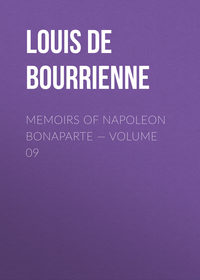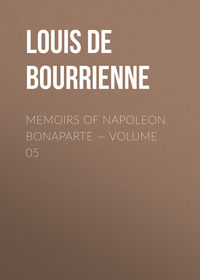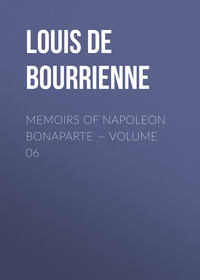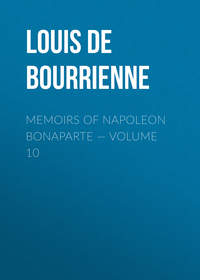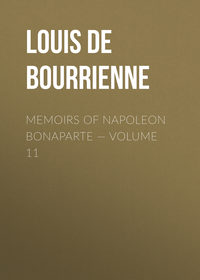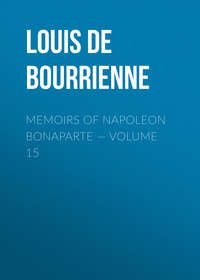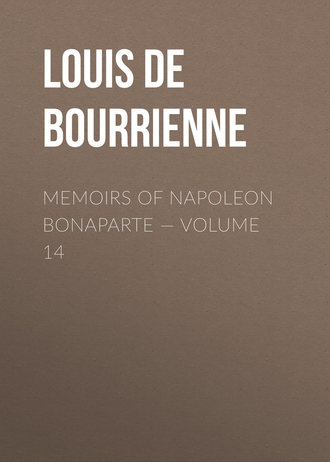 полная версия
полная версияMemoirs of Napoleon Bonaparte — Volume 14

Louis Antoine Fauvelet de Bourrienne
Memoirs of Napoleon Bonaparte — Volume 14
CHAPTER VII
—[By the Editor of the 1836 edition]—
1815.
Napoleon at Paris—Political manoeuvres—The meeting of the Champ- de-Mai—Napoleon, the Liberals, and the moderate Constitutionalists —His love of arbitrary power as strong as ever—Paris during the Cent Jours—Preparations for his last campaign—The Emperor leaves Paris to join the army—State of Brussels—Proclamation of Napoleon to the Belgians—Effective strength of the French and Allied armies —The Emperor's proclamation to the French army.
Napoleon was scarcely reseated on his throne when he found he could not resume that absolute power he had possessed before his abdication at Fontainebleau. He was obliged to submit to the curb of a representative government, but we may well believe that he only yielded, with a mental reservation that as soon as victory should return to his standards and his army be reorganised he would send the representatives of the people back to their departments, and make himself as absolute as he had ever been. His temporary submission was indeed obligatory.
The Republicans and Constitutionalists who had assisted, or not opposed his return, with Carnot, Fouche, Benjamin Constant, and his own brother Lucien (a lover of constitutional liberty) at their head, would support him only on condition of his reigning as a constitutional sovereign; he therefore proclaimed a constitution under the title of "Acte additionnel aux Constitutions de l'Empire," which greatly resembled the charter granted by Louis XVIII. the year before. An hereditary Chamber of Peers was to be appointed by the Emperor, a Chamber of Representatives chosen by the Electoral Colleges, to be renewed every five years, by which all taxes were to be voted, ministers were to be responsible, judges irremovable, the right of petition was acknowledged, and property was declared inviolable. Lastly, the French nation was made to declare that they would never recall the Bourbons.
Even before reaching Paris, and while resting on his journey from Elba at Lyons, the second city in France, and the ancient capital of the Franks, Napoleon arranged his ministry, and issued sundry decrees, which show how little his mind was prepared for proceeding according to the majority of votes in representative assemblies.
Cambaceres was named Minister of Justice, Fouche Minister of Police (a boon to the Revolutionists), Davoust appointed Minister of War. Decrees upon decrees were issued with a rapidity which showed how laboriously Bonaparte had employed those studious hours at Elba which he was supposed to have dedicated to the composition of his Memoirs. They were couched in the name of "Napoleon, by the grace of God, Emperor of France," and were dated on the 13th of March, although not promulgated until the 21st of that month. The first of these decrees abrogated all changes in the courts of justice and tribunals which had taken place during the absence of Napoleon. The second banished anew all emigrants who had returned to France before 1814 without proper authority, and displaced all officers belonging to the class of emigrants introduced into the army by the King. The third suppressed the Order of St. Louis, the white flag, cockade, and other Royal emblems, and restored the tri-coloured banner and the Imperial symbols of Bonaparte's authority. The same decree abolished the Swiss Guard and the Household troops of the King. The fourth sequestered the effects of the Bourbons. A similar Ordinance sequestered the restored property of emigrant families.
The fifth decree of Lyons suppressed the ancient nobility and feudal titles, and formally confirmed proprietors of national domains in their possessions. (This decree was very acceptable to the majority of Frenchmen). The sixth declared sentence of exile against all emigrants not erased by Napoleon from the list previously to the accession of the Bourbons, to which was added confiscation of their property. The seventh restored the Legion of Honour in every respect as it had existed under the Emperor; uniting to its funds the confiscated revenues of the Bourbon order of St. Louis. The eighth and last decree was the most important of all. Under pretence that emigrants who had borne arms against France had been introduced into the Chamber of Peers, and that the Chamber of Deputies had already sat for the legal time, it dissolved both Chambers, and convoked the Electoral Colleges of the Empire, in order that they might hold, in the ensuing month of May, an extraordinary assembly—the Champ-de-Mai.
This National Convocation, for which Napoleon claimed a precedent in the history of the ancient Franks, was to have two objects: first, to make such alterations and reforms in the Constitution of the Empire as circumstances should render advisable; secondly, to assist at the coronation of the Empress Maria Louisa. Her presence, and that of her son, was spoken of as something that admitted of no doubt, though Bonaparte knew there was little hope of their return from Vienna. These various enactments were well calculated to serve Napoleon's cause. They flattered the army, and at the same time stimulated their resentment against the emigrants, by insinuating that they had been sacrificed by Louis to the interest of his followers. They held out to the Republicans a prospect of confiscation, proscription, and, revolution of government, while, the Imperialists were gratified with a view of ample funds for pensions, offices, and honorary decorations. To proprietors of the national domains security was promised, to the Parisians the grand spectacle of the Champ-de-Mai, and to. France peace and tranquillity, since the arrival of the Empress and her son, confidently asserted to be at hand, was taken as a pledge of the friendship of Austria.
Napoleon at the same time endeavoured to make himself popular with the common people—the, mob of the Faubourg St. Antoine and other obscure quarters of Paris. On the first evening of his return, as he walked round the glittering circle met to welcome him, in the State apartments of the Tuileries, he kept repeating, "Gentlemen, it is to the poor and disinterested mass of the people that I owe everything; it is they who have brought me back to the capita. It is the poor subaltern officers and common soldiers that have done all this. I owe everything to the common people and the ranks of the army. Remember that! I owe everything to the army and the people!" Some time after he took occasional rides through the Faubourg St. Antoine, but the demonstrations of the mob gave him little pleasure, and, it was easy to detect a sneer in his addresses to them. He had some slight intercourse with the men of the Revolution—the fierce, bloodthirsty Jacobins—but even now he could not conceal his abhorrence of them, and, be it said to his honour, he had as little to do with them as possible.
When Napoleon, departed for the summer campaign he took care beforehand to leave large sums of money for the 'federes'; in the hands of the devoted Real; under whose management the mob was placed. These sums were to be distributed at appropriate seasons, to make the people cry in the streets of Paris, "Napoleon or death." He also left in the hands of Davoust a written authority for the publication of his bulletins, many clauses of which were written long before the battles were fought that they were to describe. He gave to the same Marshal a plan of his campaign, which he had arranged for the defensive. This was not confided to him without an injunction of the strictest secrecy, but it is said that Davoust communicated the plan to Fouche. Considering Davoust's character this is very unlikely, but if so, it is far from improbable that Fouche communicated the plan to the Allies with whom, and more particularly with Prince Metternich, he is well known to have been corresponding at the time.
Shortly after the Emperor's arrival in Paris Benjamin Constant, a moderate and candid man, was deputed by the constitutional party to ascertain Napoleon's sentiments and intentions. Constant was a lover of constitutional liberty, and an old opponent of Napoleon, whose headlong career of despotism, cut out by the sword, he had vainly endeavoured to check by the eloquence of his pen.
The interview took place at the Tuileries. The Emperor, as was his wont, began the conversation, and kept it nearly all to himself during the rest of the audience. He did not affect to disguise either his past actions or present dispositions.
"The nation," he said, "has had a respite of twelve years from every kind of political agitation, and for one year has enjoyed a respite from war. This double repose has created a craving after activity. It requires, or fancies it requires, a Tribune and popular assemblies. It did not always require them. The people threw themselves at my feet when I took the reins of government You ought to recollect this, who made a trial of opposition. Where was your support—your strength? Nowhere. I assumed less authority than I was invited to assume. Now all is changed. A feeble government, opposed to the national interests, has given to these interests the habit of standing on the defensive and evading authority. The taste for constitutions, for debates, for harangues, appears to have revived. Nevertheless it is but the minority that wishes all this, be assured. The people, or if you like the phrase better; the multitude, wish only for me. You would say so if you had only seen this multitude pressing eagerly on my steps, rushing down from the tops of the mountains, calling on me, seeking me out, saluting me. On my way from Cannes hither I have not conquered—I have administered. I am not only (as has been pretended) the Emperor of the soldiers; I am that of the peasants of the plebeians of France. Accordingly, in spite of all that has happened, you see the people come back to me. There is sympathy between us. It is not as with the privileged classes. The noblesse have been in my service; they thronged in crowds into my antechambers. There is no place that they have not accepted or solicited. I have had the Montmorencys, the Noailles, the Rohans, the Beauveaus, the Montemarts, in my train. But there never was any cordiality between us. The steed made his curvets—he was well broken in, but I felt him quiver under me. With the people it is another thing. The popular fibre responds to mine. I have risen from the ranks of the people: my voice seta mechanically upon them. Look at those conscripts, the sons of peasants: I never flattered them; I treated them roughly. They did not crowd round me the less; they did not on that account cease to cry, `Vive l'Empereur!' It is that between them and me there is one and the same nature. They look to me as their support, their safeguard against the nobles. I have but to make a sign, or even to look another way, and the nobles would be massacred in every province. So well have they managed matters in the last ten months! but I do not desire to be the King of a mob. If there are the means to govern by a constitution well and good. I wished for the empire of the world, and to ensure it complete liberty of action was necessary to me. To govern France merely it is possible that a constitution may be better. I wished for the empire of the world, as who would not have done in my place? The world invited me to rule over it. Sovereigns and subjects alike emulously bowed the neck under my sceptre. I have seldom met with opposition in France, but still I have encountered more of it from some obscure and unarmed Frenchmen than from all these Kings so resolute, just now, no longer to have a man of the people for their equal! See then what appears to you possible; let me know your ideas. Public discussion, free elections, responsible ministers, the liberty of the press, I have no objection to all that, the liberty of the press especially; to stifle it is absurd. I am convinced on this point. I am the man of the people: if the people really wish for liberty let them have it. I have acknowledged their sovereignty. It is just that I should lend an ear to their will, nay, even to their caprices I have never been disposed to oppress them for my pleasure. I conceived great designs; but fate 'has been against me; I am no longer a conqueror, nor can I be one. I know what is possible and what is not.—I have no further object than to raise up France and bestow on her a government suitable to her. I have no hatred to liberty, I have set it aside when it obstructed my path, but I understand what it means; I was brought up in its school: besides, the work of fifteen years is overturned, and it is not possible to recommence it. It would take twenty years, and the lives of 2,000,000 of men to be sacrificed to it. As for the rest, I desire peace, but I can only obtain it by means of victory. I would not inspire you with false expectations. I permit it to be said that negotiations are going on; there are none. I foresee a hard struggle, a long war. To support it I must be seconded by the nation, but in return I believe they will expect liberty. They shall have it: the circumstances are new. All I desire is to be informed of the truth. I am getting old. A man is no longer at forty-five what he was at thirty. The repose enjoyed by a constitutional king may suit me: it will still more certainly be the best thing, for my son."
From this remarkable address. Benjamin Constant concluded that no change had taken place in Bonaparte's views or feelings in matters of government, but, being convinced that circumstances had changed, he had made up his mind to conform to them. He says, and we cannot doubt it, "that he listened to Napoleon with the deepest interest, that there was a breadth and grandeur of manner as be spoke, and a calm serenity seated on a brow covered with immortal laurels."
Whilst believing the utter incompatibility of Napoleon and constitutional government we cannot in fairness omit mentioning that the causes which repelled him from the altar and sanctuary of freedom were strong: the real lovers of a rational and feasible liberty—the constitutional monarchy men were few—the mad ultra-Liberals, the Jacobins, the refuse of one revolution and the provokers of another, were numerous, active, loud, and in pursuing different ends these two parties, the respectable and the disreputable, the good and the bad, got mixed and confused with one another.
On the 14th of May, when the 'federes' were marshalled in processional order and treated with what was called a solemn festival, as they moved along the boulevards to the Court of the Tuileries, they coupled the name of Napoleon with Jacobin curses and revolutionary songs. The airs and the words that had made Paris tremble to her very centre during the Reign of Terror—the "Marseillaise," the "Carmagnole," the "Jour du depart," the execrable ditty, the burden of which is, "And with the entrails of the last of the priests let us strangle the last of the kings," were all roared out in fearful chorus by a drunken, filthy, and furious mob. Many a day had elapsed since they had dared to sing these blasphemous and antisocial songs in public. Napoleon himself as soon as he had power enough suppressed them, and he was as proud of this feat and his triumph over the dregs of the Jacobins as he was of any of his victories; and in this he was right, in this he proved himself the friend of humanity. As the tumultuous mass approached the triumphal arch and the grand entrance to the Palace he could not conceal his abhorrence. His Guards were drawn up under arms, and numerous pieces of artillery, already loaded were turned out on the Place du Carrousel. He hastily dismissed these dangerous partisans with some praise, some money, and some drink. On coming into close contact with such a mob he did not feel his fibre respond to that of the populace! Like Frankenstein, he loathed and was afraid of the mighty monster he had put together.
But it was not merely the mob that checked the liberalism or constitution of Napoleon, a delicate and doubtful plant in itself, that required the most cautious treatment to make it really take root and grow up in such a soil: Some of his councillors, who called themselves "philosophical statesmen," advised him to lay aside the style of Emperor, and assume that of High President or Lord General of the Republic! Annoyed with such puerilities while the enemy was every day drawing nearer the frontiers he withdrew from the Tuileries to the comparatively small and retired palace of the Elysee, where he escaped these talking-dreamers, and felt himself again a sovereign: Shut up with Benjamin Constant and a few other reasonable politicians, he drew up the sketch of a new constitution, which was neither much better nor much worse than the royal charter of Louis XVIII. We give an epitome of its main features.
The Emperor was to have executive power, and to exercise legislative power in concurrence with the two Chambers. The Chamber of Peers was to be hereditary, and nominated by the Emperor, and its number was unlimited. The Second Chamber was to be elected by the people, and to consist of 629 members; none to be under the age of twenty-five. The President was to be appointed by the members, but approved of by the Emperor. Members were to be paid at the rate settled by the Constituent Assembly, which was to be renewed every five years. The Emperor might prorogue, adjourn, or dissolve the House of Representatives, whose sittings were to be public. The Electoral Colleges were maintained. Land tax and direct taxes were to be voted only for a year, indirect taxes might be imposed for several years. No levy of men for the army nor any exchange of territory was to be made but by a law. Taxes were to be proposed by the Chamber of Representatives. Ministers to be responsible. Judges to be irremovable. Juries to be established. Right of petition, freedom of worship, inviolability of property, were recognised. Liberty of the press was given under legal responsibility, and press offences were to be judged with a jury. No place or part of the territory could be placed in a state of siege except in case of foreign invasion or civil troubles. Finally, the French people declared that in the delegation it thus made of its powers it was not to be taken as giving the right to propose the re-establishment of the Bourbons, or of any Prince of that family on the throne, even in case of the extinction of the imperial dynasty. Any such proposal was formally interdicted to the Chambers or to the citizens, as well as any of the following measures,.viz. the re-establishment of the former, feudal nobility, of the feudal and seignorial rights, of tithes, of any privileged and dominant religion, as well as of the power of making any attack on the irrevocability of the sale of the national goods.
Shortly after the return of Napoleon from Elba, believing it to be impossible to make the Emperor of Austria consent to his wife's rejoining him (and Maria Louisa had no inclination to a renewal of conjugal intercourse), Napoleon had not been many days in Paris when he concocted a plan for carrying off from Vienna both his wife and his son: In this project force was no less necessary than stratagem. A number of French of both sexes much devoted to the Emperor, who, had given them rank and fortune, had accompanied Maria Louisa in 1814 from Paris to Blois and thence to Vienna. A correspondence was opened with these persons, who embarked heart and soul in the plot; they forged passports, procured- relays, of horses; and altogether arranged matters so well that but a for a single individual—one who revealed the whole project a few days previously to that fixed upon for carrying it into effect—there is little room to doubt that the plan would have succeeded, and that the daughter of Austria and the titular King of home would have given such, prestige as their presence could give at the Tuileries and he Champs-de- Mai. No sooner had the Emperor of Austria discovered this plot, which, had it been successful, would have placed him in a very awkward predicament, than he dismissed all the French people about his daughter, compelled her to lay aside the armorial bearings and liveries of Napoleon, and even to relinquish the title of Empress of the French: No force, no art, no police could conceal these things from the people of Paris; who, moreover, and at nearly the same time; were made very uneasy by the failure of Murat's attempt in Italy, which greatly increased the power and political influence of Austria. Murat being disposed of, the Emperor Francis was enabled to concentrate all his forces in Italy, and to hold them in readiness for the re-invasion of France.
"Napoleon," says Lavallette, "had undoubtedly expected that the Empress and his son would be restored to him; he had published his wishes as a certainty, and to prevent it was, in fact, the worst injury the Emperor of Austria could have done, him. His hope was, however, soon destroyed.
"One evening I was summoned to the palace. I found the Emperor in a dimly-lighted closet, warming himself in a corner of the fireplace, and appearing to suffer already from the complaint which never afterwards left him. 'Here is a letter,' he said, 'which the courier from Vienna says is meant for you—read it.' On first casting my eyes on the letter I thought I knew the handwriting, but as it was long I read it slowly, and came at last to the principal object. The writer said that we ought not to reckon upon the Empress, as she did not even attempt to conceal her dislike of the Emperor, and was disposed to approve all the measures that could be taken against him; that her return was not to be thought of, as she herself would raise the greatest obstacles in the way of it; in case it should be proposed; finally, that it was not possible for him to dissemble his indignation that the Empress, wholly enamoured of ——, did not even take pains to hide her ridiculous partiality for him. The handwriting of the letter was disguised, yet not so much but that I was able to discover whose it was. I found; however, in the manner in which the secret was expressed a warmth of zeal and a picturesque style that did not belong to the author of the letter. While reading it, I all of a sudden suspected it was a counterfeit, and intended to mislead the Emperor. I communicated ms idea to him, and the danger I perceived in this fraud. As I grew more and more animated I found plausible reasons enough to throw the Emperor himself into some uncertainty. 'How is it possible,' I said, 'that ——- should have been imprudent enough to write such things to me, who am not his friend, and who have had so little connection with him? How can one suppose that the Empress should forget herself, in such circumstances, so far as to manifest aversion to you, and, still more, to cast herself away upon a man who undoubtedly still possesses some power to please, but who is no longer young, whose face is disfigured, and whose person, altogether, has nothing agreeable in it?' 'But,' answered the Emperor, ——- is attached to me; and though he is not your friend, the postscript sufficiently explains the motive of the confidence he places in you.' The following words were, in fact, written at the bottom of the letter: 'I do not think you ought to mention the truth to the Emperor, but make whatever use of it you think proper.' I persisted, however, in maintaining that the letter was a counterfeit; and the Emperor then said to me, 'Go to Caulaincourt. He possesses a great many others in the same handwriting. Let the comparison decide between your opinion and mine.'
"I went to Caulaincourt, who said eagerly to me, 'I am sure the letter is from ——-, and I have not the least doubt of the truth of the particulars it contains. The best thing the Emperor can do is to be comforted; there is no help to be expected from that side.'
"So sad a discovery was very painful to the Emperor, for he was sincerely attached to the Empress, and still hoped again to see his son, whom he loved most tenderly.'
"Fouche had been far from wishing the return of the Emperor. He was long tired of obeying, and had, besides, undertaken another plan, which Napoleon's arrival had broken off. The Emperor, however, put him again at the head of the police, because Savary was worn out in that employment, and a skillful man was wanted there. Fouche accepted the office, but without giving up his plan of deposing the Emperor, to put in his place either his son or a Republic under a President. He had never ceased to correspond with Prince Metternich, and, if he is to be believed, he tried to persuade the Emperor to abdicate in favour of his son. That was also my opinion; but; coming from such a quarter, the advice was not without danger for the person to whom it was given. Besides, that advice having been rejected, it: was the duty of the Minister either to think no more of his plan or to resign his office. Fouche, however, remained in the Cabinet; and continued his correspondence. The Emperor, who placed but little confidence in him; kept a careful eye upon him. One evening the Emperor: had a great deal of company at the Elysee, he told me not to go home, because he wished to speak to me. When everybody was gone the Emperor stopped with Fouche in the apartment next to the one I was in. The door remained half open. They walked up and down together talking very calmly. I was therefore greatly astonished when, after a quarter of, an hour, I heard the Emperor say to him' gravely, 'You are a traitor! Why do you remain Minister of the Police if you wish to betray me? It rests with me to have you hanged, and everybody would rejoice at your death!' I did not hear Fouche's reply, but the conversation lasted above half an hour longer, the parties all the time walking up and down. When Fouche went away he bade me cheerfully, good-night, and said that the Emperor had gone back to his apartments.


